By Texas Homesteader ~
Coriander is a delicious spice to use in your cooking. I grow and preserve coriander from my garden each year for FREE! Find out how.
Is Cilantro Seed Also Known As Coriander Spice?
Yes, when cilantro goes to seed it’s referred to the spice coriander. So cilantro is a double-benefit plant to have in your garden. It’s both an herb AND a spice!
I use coriander in my cooking from time to time. But because I don’t use it often I’d hate to buy a bottle of coriander. It would just go stale before I could use the whole bottle. But luckily I don’t have to buy it.
You see, I always have cilantro in my garden. It typically comes up on a volunteer basis as a result of seed falling to the ground. But cilantro seed is… coriander.
So I take advantage of this dual-purpose garden goodie and harvest coriander when the cilantro is done, typically around the end of May here in NE Texas.
Volunteer Cilantro Plants For FREE!
Because the cilantro growing in my garden is usually a volunteer plant, it sprouts up in the oddest places.
In any given garden year I have plenty of cilantro that sprouts in my permanent beds such as my onion or garlic spaces. That’s not where I would have planted it, yet I allow cilantro volunteers to grow there.
Someone who requires an organized garden would probably be driven crazy by the randomness here. And to be honest, I walk the line somewhere between an organized and a chaotic gardener.
I typically have plantings staged neatly. I like to have the garden look orderly and peaceful.
But there are occasions where I allow something to grow right where it is. Especially these cilantro volunteers since I know that it’s a short-lived herb.
Cilantro will bolt and go to seed at the first hint of heat, usually around mid to late May.
So I allow it to grow wherever it decides to sprout, knowing that it won’t be there for the entire growing season anyway.
Cooking With Fresh Cilantro
To me, cilantro doesn’t retain its flavor at all when it’s dried. Some gardeners like to chop fresh cilantro, add olive oil & freeze it in ice cube trays to preserve the flavor.
But a cilantro-flavored oil cube is not how I’d cook with cilantro, so I don’t preserve it that way either. Therefore I can’t speak to the flavor nor culinary use of frozen oil-cube cilantro. But it’s certainly a popular way to preserve it.
Instead I’ll harvest that cilantro to use fresh for making Cilantro-Lime Rice, enjoying homemade Pico de Gallo and/or flavoring any number of Tex-Mex styled dishes that are always on tight rotation in my kitchen.
Cilantro Setting Seed is Coriander
When I see those dainty white flowers on my cilantro I know my fresh cilantro-eating time is limited. I know I won’t be able to harvest from it much longer.
But I also know that seeds will be forming soon. In the meantime the bees love those tiny white blooms.
Soon the blossoms fade and tiny round green seeds form. They get a little larger before the green color is replaced by a dry light brown color. NOW the coriander is ready to harvest.
Harvesting Coriander Seed From Cilantro
I’ll go to the garden & cut the bolted cilantro plant down and bring the now-spindly plants inside.
Harvesting coriander isn’t hard, but it’s certainly more labor intensive for me than, say, green bean or okra seed where you just allow the veggie to dry with the seeds inside.
But to be able to provide this homegrown spice, I’m willing to persevere. It’s not hard, just slightly more time consuming.
How To Harvest Coriander Seeds
Those coriander seeds are now hard little dry balls. So pulling them from the stem means they’ll roll everywhere on your counter and onto the floor. So I needed a way to keep it all corralled neatly as I harvest them.
To make harvesting those seeds easier I’ll bring out a jelly-roll styled baking pan because it’s large, flat and has sides. This will contain all those coriander seeds quite nicely.
Now I simply take a bundle of coriander seeds between my fingers and strip them off the plant and onto the pan. I continue this until all the coriander is removed.
Now keep in mind that this is just cilantro seed. So if I desire, I can sprinkle a bit back into the garden to assure I get some cilantro next year. But to be honest, the cilantro always comes back on its own. I haven’t actually planted it in years.
Now that I have my coriander harvested I scan for any debris & roughly pick out & remove the tiny stems and bits of dry cilantro leaf. But I don’t worry about getting absolutely everything out of the coriander. It’s going to be ground up anyway when I use it and the tiny stems and small amount of dried cilantro leaves shouldn’t affect the flavor.
Air Dry Coriander Completely
I typically allow the seeds to air dry further for several days.
Nothing is worse than having a tiny bit of moisture in food you’ve harvested and dried before storing in a jar. That tiny amount of moisture will destroy the entire jar of contents. I’m not willing to take that chance. Especially since the coriander takes more time than other garden seeds to harvest.
So I pour the coriander into a wide-mouth bowl and set it on my countertop. Every now & then I’ll run my hands through the bowl of coriander and fluff the seeds, making sure it all gets dry before pouring it into a labeled jar.
I’ll put about a tablespoon worth of seeds into my seed stash for next year just in case I need to plant some.
Then I’ll grind this coriander for use during the remainder of the year. My primary use for it is as a necessary spice ingredient in my Homemade Breakfast Sausage Seasoning.
But since coriander pairs well with cumin, I can use it in many of the Tex-Mex dishes I enjoy serving.
Lightly Roasting Option
Sometimes I’ll lightly dry-roast the seeds – just a bit to intensify the flavor. I simply place them in a hot cast-iron skillet and roast them, stirring constantly until they’re all toasty colored.
The seeds will make a popping noise as they roast. But they can roast too much pretty quickly!
So keep stirring and take them off the heat when they’re as toasty-colored as you like. (a little extra brown on just a few is my preference since I like the smoky flavor it imparts).
Storing Dry Coriander
Then I’ll cool the roasted coriander and place into jars. I prefer the flavor of roasted coriander but to be honest, sometimes I skip this roasting step all together. Shootin’ from the hip in the kitchen, y’all. That’s my game!
It would probably be most convenient to grind it all now, but I like to grind it in smaller quantities. I just feel it stays fresher that way.
So I grind enough to make a couple of tablespoons of ground coriander spice and then leave the others whole and sealed in a glass jar until I use up what little I’ve ground. At that time I’ll grind some more. This is the method that works best for me.
Growing Food & Providing For My Family
So this coriander spice is basically free to me. The cilantro plant sprouts voluntarily and I use it in my cooking while it’s growing.
Then I harvest the resulting coriander spice for cooking afterward. So cilantro provides both an herb as well as a spice!
All it takes is a bit of my time to provide this spice for my kitchen. And isn’t that what self-sufficiency is all about?
~TxH~
My Favorite Garden Hacks
- Easy Garden Planning Spreadsheet
- Getting A Jump: Planting An Indoor Greenhouse
- Repurposed Cardboard Seed-Starting Pots
- 3-Sister’s Garden – The Original Companion Planting
- Planting A Large Galvanized Trough
- Tricking Birds AWAY From Your Strawberry Plants
- Easy Compost For A Healthy Garden
- Propping Tender Seedlings
- Cheap (or FREE) Wood Mulch For The Garden
- Using Vining Plants For Living Mulch
- Homestead Hack: Remember Where You Planted Seeds
- Keeping Potted Plants Watered
- Planting A Blueberry Bush In Galvanized Tub
- Stevia – Growing Your Own Sweetener!
- How I Use EcoBricks In The Garden
- Repurposing A Coffee Can For Deep-Soak Watering
- How Leaves Benefit Your Garden
- My Simple, Zero-Waste Herb Drying Setup
- The Lazy Gardener’s Plant List – Plant Once, Eat For Years!
- How To Tell When Watermelon Is Ripe
- Luffa A Surprising Zucchini Substitute!
- How To Make Your Own Garden Soil
- Easy Homemade Seed Tape
MORE Gardening Posts
C’mon by & sit a spell! Come hang out at our Facebook Page. It’s like sitting in a front porch rocker with a glass of cold iced tea – lots of good folks sharing! You can also follow along on Pinterest, Twitter or Instagram.
If you’d like to receive an email each time a new blog post goes live it’s EASY to
Subscribe to our blog!

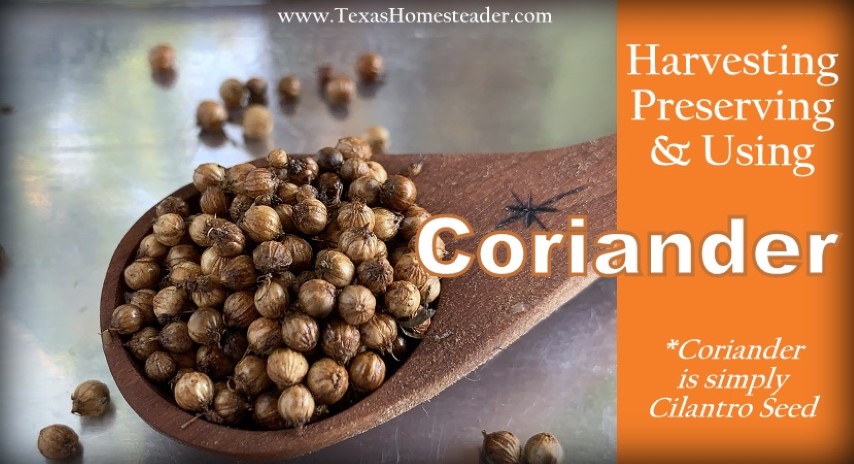
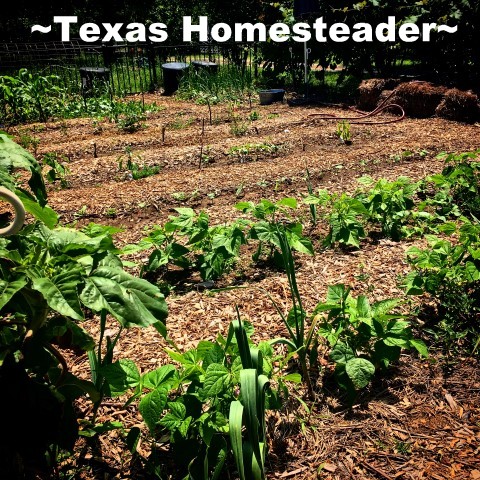
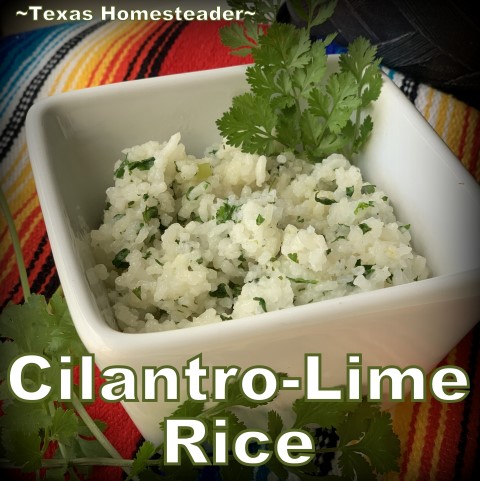
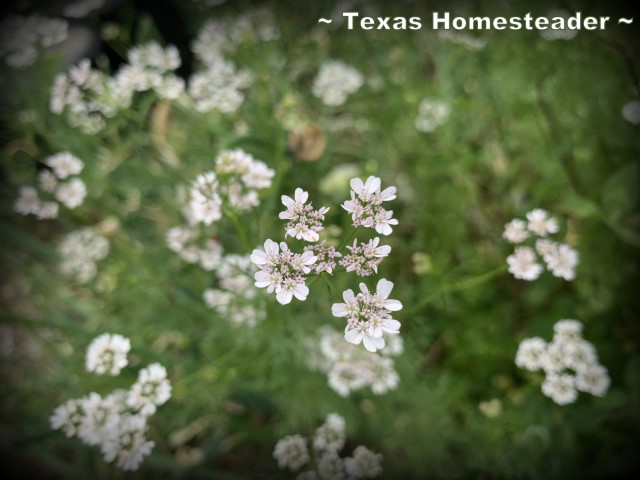
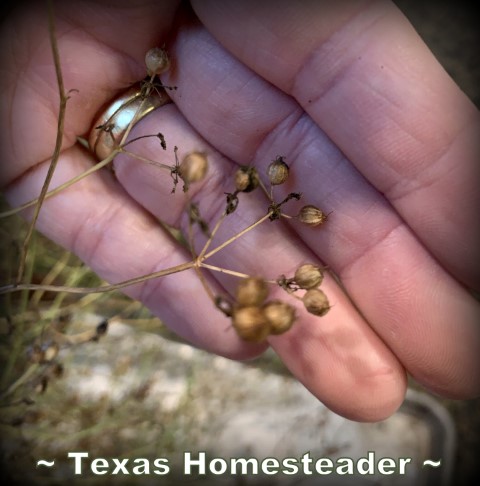
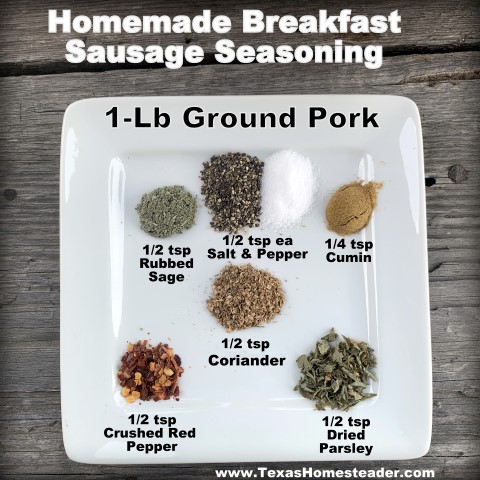
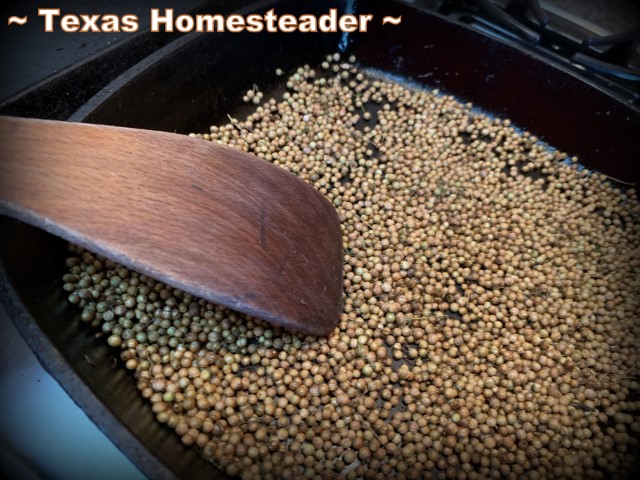
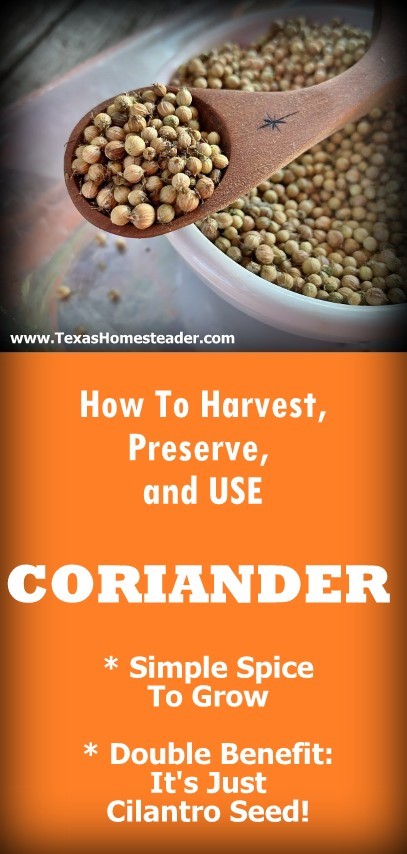



I have a large pepper grinder that l use when cooking. It is filled with different coloured peppercorns, coriander, small amounts of mustard seeds, and dried rosemary. My family calls it ‘super pepper’! My sisters actually ask for me to gift them my mix for Christmas. I never grew cilantro, but will add it to my garden for next year.
Super Pepper – oh how I love that Beth! And as you mentioned, what a great homemade gift idea too. ~TxH~
Hello Texas,
I’ve never been a big fan of coriander or cilantro but it’s interesting to read about your harvests and preserving of it. One of the things that just keeps on keeping on in my garden is tarragon. The plants are big bushy things that seem to winter over here. I’ve got a couple of plants and I trim them back, loosely tie the stems together and hang them in my utility room until they’re dry enough to kind of run small handfuls back and forth in my hands onto a jelly roll pan, pick out any stems that are a little too big and store them in a beautiful jar that once held some fancy olives. I like it on buttered noodles or baked (and buttered) potatoes and sometimes a pinch into a pot of long simmering spaghetti sauce.
Stay well,
Candace (with owls) in Oregon
I love cilantro, but usually I’m only mildly interested in coriander (although I’ll probably experiment with it now that I’ve harvested so much) But I do need coriander for my breakfast sausage seasoning so I’ll for sure be using it often for that. Although I certainly have heard of it, I’ll admit I’m not sure I’ve ever actually tasted tarragon. But your herb preservation and running small handfuls back & forth in your hands into a jellyroll pan are exactly the same procedures I use. (Sometimes I think you could be my long-lost sister!) And I love that you store it in pretty repurposed jars too. Enjoy your owl watching! ~TxH~